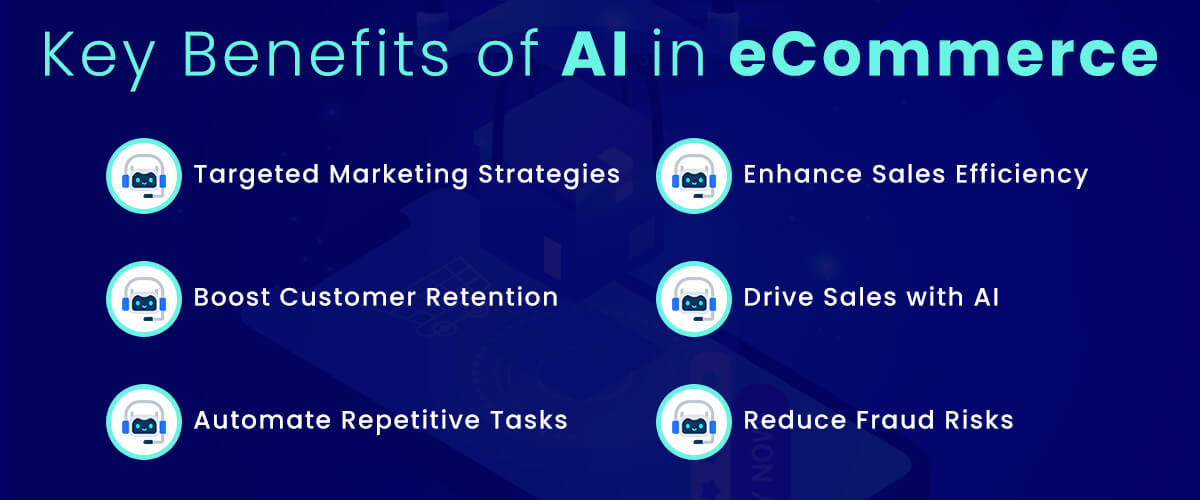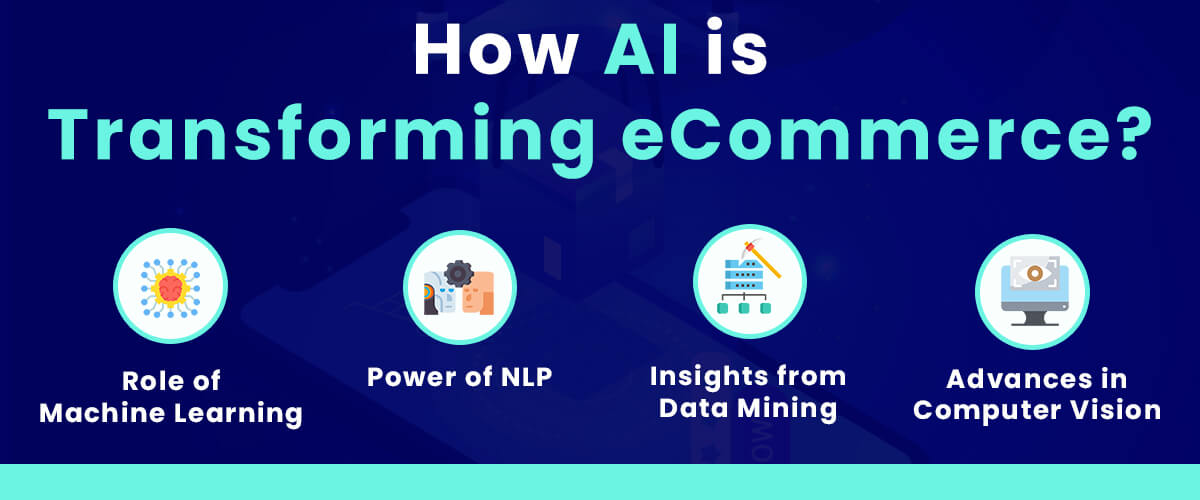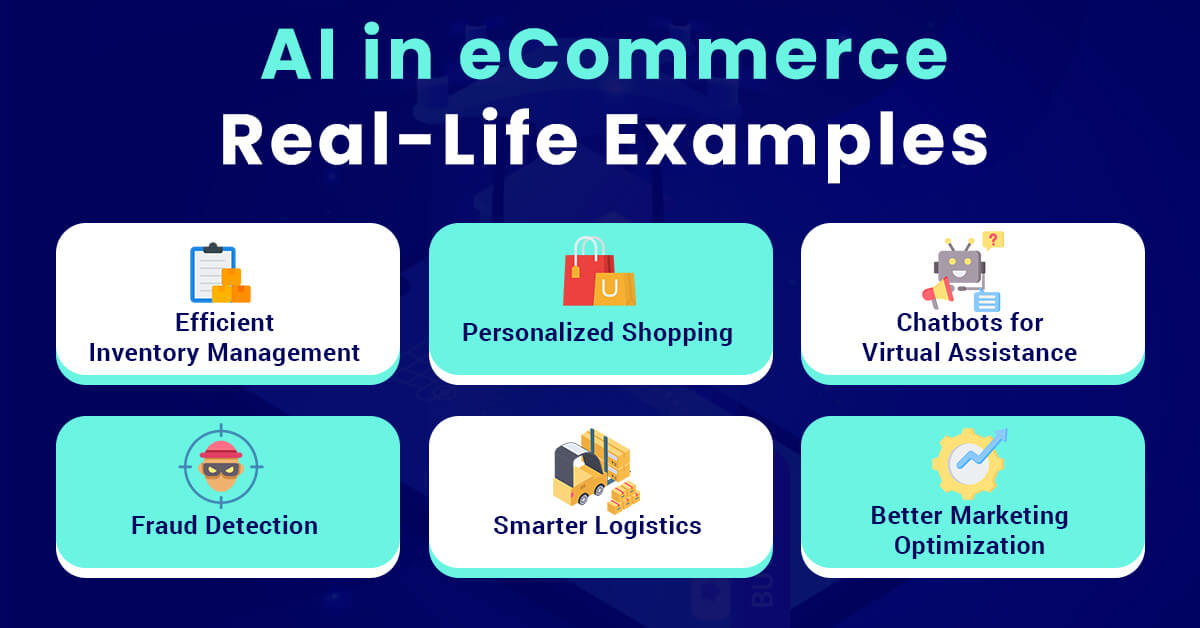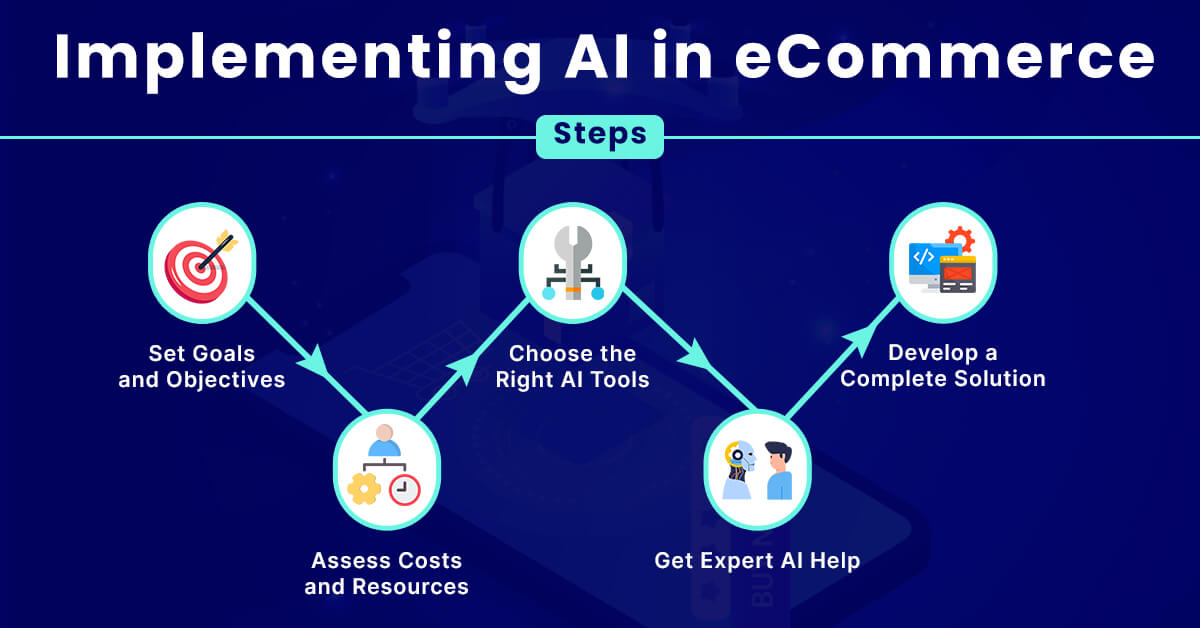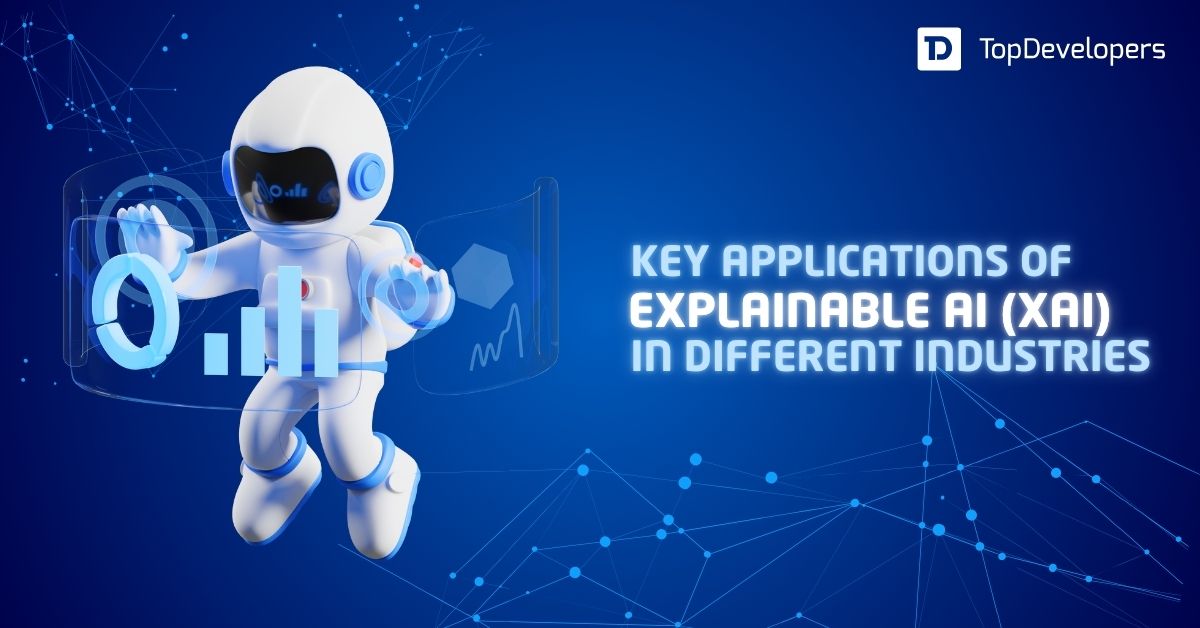
The global impact of AI in ecommerce is transformative, potentially growing AI in the ecommerce market size from $8.06 billion in 2024 to $14.07 billion by 2028 at a CAGR of 14.9%. Personalized shopping experiences, enhanced search, virtual assistants, and government support contribute to the growth. The eCommerce sector will see an expansion of AI’s footprint as it focuses on customer data analytics, supply chain management, intelligent product recommendations, and conversational commerce.
By utilizing real-world artificial intelligence use cases in the e-commerce sector that provide performance, financial, and other advantages, eBay, Alibaba, Amazon, and Walmart effectively demonstrated that artificial intelligence in e-commerce leads to customer-centric innovation. It should not be too far off; it should become a necessary friend in the e-commerce space.
This blog will cover the components of artificial intelligence technology that drive the eCommerce market, the benefits of employing AI in eCommerce, the actual AI applications transforming the eCommerce sector, and the methods for using AI strategies in eCommerce businesses. This blog will help you discover how to run your e-commerce company and expand using artificial intelligence technologies.
Table of Contents
Top Benefits of Using AI in eCommerce
From sci-fi movies to possible use cases, artificial intelligence in eCommerce clearly shapes technology and results in great advantages for online retailers.
Targeted marketing to attract potential prospects
In eCommerce marketing, it is crucial to deliver relevant marketing messages that consumers want to receive. The e-commerce company provides pertinent information at the appropriate moment, so there is more likelihood of the consumers seeing the message and buying the goods or services.
AI allows one to deliver a set of ads to a group of targeted consumers by hyper segmenting them depending on demographics, search behaviors, age, and activity. It lowers the acquiring cost by raising the possibility of ad clicks. Moreover, a common retargeting tool driven by artificial intelligence-powered push notifications is always reminding consumers about the newest offer, new arrivals, or others depending on user searches and browsing behaviors research.
High customer retention with remarketing
Reminding them of the items they are seeking to acquire or have previously purchased in the past helps existing customers increase their likelihood of visiting the shop and completing the transaction. Furthermore, employing artificial intelligence in product remarketing allows one to approach consumers in a hyper-targeted manner, therefore delighting them and keeping them
Using artificial intelligence in remarketing ads guarantees that your online e-commerce company remains at the top of clients’ interests. Customized marketing greatly raises retention rates and generates much more money.
Task automation to eliminate repetitive work
Online e-commerce businesses are growing in popularity, as they are accessible around the clock via all media. With AI-enabled automation, companies may save time and effort by quickly responding to consumer questions contextually. Companies use the saved time to address complex consumer queries, thereby boosting conversion rates and generating substantial profit margins.
By rapidly showcasing a new product launch on all channels and automatically sending discount messages to privileged consumers, product suggestions, and low-level assistance, artificial intelligence also aids in sales synchronization.
Improved sales process efficacy
More than just offering appealing discounts will help consumers reach the bottom of the sales funnel. For instance, constant follow-through behavior of particular consumers—such as cart abandonment or repeated browsing of the same product—increases the possibility of converting them into actual consumers. Simple inquiries and responses from bots about the sales process help the clients to be complete in their purchase and guarantee no distraction.
Increase sales with AI power
The role of AI in sales is impressive, from sales communication transformation to uncovering hidden opportunities. Using sentiment analysis, lead scoring, and artificial intelligence suggestions changes the game for boosting sales.
Custom discounts, virtual voice assistants, chatbot assistance, and customized suggestions help consumers to make purchases by means of the personalized shopping experience. Furthermore, focused marketing and promotion enable the approach of the appropriate consumers with the appropriate message at the appropriate moment, therefore boosting sales on a mass basis.
Minimize fraudulent activities
Growing cybercrimes prevent some users from entering their bank information and making online transactions. AI security systems track users’ behavior and transactions constantly to identify suspicious risks and catch fraudsters right away, thereby stopping the damage they do to the online shop. Using artificial intelligence to analyze user activity helps create customer profiles, thereby enabling quick identification of account takeover situations by means of deviations from normal trends.
Advanced pattern identification and data linkages made possible by artificial intelligence help to discover frauds unattainable for human awareness. Moreover, artificial intelligence learns from fresh data that helps adapt to improving fraud detection and response strategies so that AI constantly remains one step ahead of fraudsters.
Top Use Cases of AI in eCommerce
• Product Recommendations
Using machine learning and artificial intelligence, goods are suggested depending on browsing and buying behavior, therefore creating chances for cross-selling and upselling.
• Visual and Voice Search
Using photos or voice instructions, consumers may search for items, therefore facilitating accurate and easy product discovery.
• Chatbots and Virtual Assistants
Artificial intelligence-driven bots answer consumer questions, guide consumers through the purchase process, and provide post-buy assistance.
• Inventory Forecasting
AI forecasts demand patterns going forward, therefore improving inventory control and lowering the expenses related to either too much or too little supply.
• Dynamic Pricing Engines
Real-time pricing changes grounded on competitive behavior, consumer demand, and market circumstances.
• Fraud Detection Systems
AI monitors transactions for irregularities and flags possibly fraudulent behavior to stop losses in the finances.
• Customer Segmentation and Targeted Marketing
AI divides consumers according to tastes and behavior, therefore facilitating more tailored and successful marketing initiatives.
Implementation Steps for AI in eCommerce
Identify Business Objectives
Clearly state the objectives for AI adoption: enhancing personalization, automating assistance, or inventory optimization.
Choose the Right Tools and Platforms
Choose AI solutions (such as analytics tools, recommendation engines, and chatbots driven by AI) that interact with your current eCommerce platform.
Collect and Organize Data
Artificial intelligence effectiveness depends on solid datasets, which provide access to excellent customer, sales, and inventory data.
Integrate AI Solutions
Implement AI technologies into your website, CRM, and marketing platforms, working with internal teams or outside technology partners.
Monitor and Optimize
Track artificial intelligence performance constantly, get comments, and modify algorithms to provide better results and fit evolving corporate demands.
AI Bringing a Paradigm Shift in the eCommerce Industry—How?
With possible applications impossible to envision previously, artificial intelligence technology has reinvented the eCommerce sector. Its uses help to make e-commerce sites clever in diverse spheres.
Popularly known as ML technology, machine learning lets computers anticipate with accuracy by learning from data using statistical methods. Further subsets of ML used for improved data interpretation include deep learning and big language models. With sales trends analysis, the self-learning ML and DL algorithms provide exact inventory management forecasts. Improved client contacts and unparalleled experience delivery depend on better data comprehension.
Natural language processing, often known as NLP technology, lets computers create insights from the gathered data and intelligibly read human-written material. E-commerce companies utilize natural language processing to provide chatbots with more contextually answering capability for consumer questions. Intelligent chatbots react fast to user questions 24/7, therefore ensuring active customer assistance for the shop around the clock.
Data mining gathers past and present data to enable artificial intelligence systems to learn and provide forecasts. Petabytes of data produced by e-commerce companies are constantly expanding, and AI enables them to compile and evaluate different kinds of data to provide useful insights. The finest examples of the same are AI-powered product suggestions depending on prior sales data and present browsing behavior.
Computer vision lets machines scan photos and movies and decipher data in seconds. With picture search capabilities, e-commerce businesses use computer vision to enhance product search. Modern consumers find it very common to take a photo of the product and then utilize computer vision-powered image recognition capability to identify the goods quickly.
Six Real-Life Use Cases of AI in eCommerce
Looking forward, the future of artificial intelligence is mostly important, as it enables the intelligent operation of many facets of online e-commerce stores. E-commerce stores utilize their AI technologies primarily in six key use cases.
Inventory management
User experience is affected by low inventory; too much inventory increases waste and storage expenses. Using historical and current sales data analysis, AI-enabled inventory control guarantees ideal inventory levels are maintained.
Attached to every product track from the warehouse to the distribution center and subsequently to the consumers are RFID tags. It shows which goods are selling quickly and in which area of the country. Through supplier connectivity, the gathered data automatically restocks inventories on schedule. It guarantees always having the necessary items for inventory.
Alibaba’s AI-driven Instant Assistance tool, for instance, lets companies make educated choices by speeding buyer-supplier contact to get data about soon-to-be product purchases.
Personalized shopping experience
Starting with smart search and obtaining customized suggestions for product purchases, a personalized shopping experience finishes at the projected shipment time and payment choices. Artificial intelligence search, utilizing faceted search, navigation, recent searches, and autocomplete methods, helps consumers quickly identify what they are looking for. For tailored product suggestions, artificial intelligence gathers and analyzes consumers’ purchasing history, browsing behavior, and ordering trends.
Under headlines like “Customers also viewed” or “People also purchased,” Amazon effectively used AI-based product suggestions that grasped consumers’ purchasing behavior and proposed complimentary items.
Ahead of its time, eBay enabled an AI-powered “Find It on eBay” tool that speeds up product discovery by using picture submissions to facilitate searches. Personalized buying recommendations from ShopBot include consumers and increase their purchasing behavior with the greatest experience.
Virtual assistance with chatbots
Like the greatest customer agents in several languages and time zones, chatbots operate actively 24/7 and virtually answer user questions. AI links the connections and offers meaningful information to consumers using ML, NLP, computer vision, and DL models; therefore, it exceeds human speed and accuracy levels in many fields. It also enables live support agents to quickly settle conflicts.
By connecting physical and online retailers, artificial intelligence simplifies bulk demand management, order processing, and transaction handling. In addition to providing 24/7 customer assistance, virtual assistants using voice technology also help consumers during the online purchasing process. Without having visitors return to the previous page, an AI-enabled checkout page immediately answers all of their inquiries on product details and delivery information.
Fraud prevention
The damages resulting from worldwide E-Commerce fraud have grown to $48 billion with new malware sample detection. For e-commerce expansion, this horrible statistic on payment fraud in a cloud environment is detrimental.
Using AI in cloud computing enhances security by adding an extra layer of defense, thereby improving security. It is strong at tracking and spotting abnormalities in transactions that would be difficult to find using conventional means. For instance, many transactions in a short period of time, high-value transfers, or transactions from far-off sites are promptly highlighted.
To forecast and stop fraud, ML models constantly create and evaluate user profiles depending on users’ previous and current browsing behaviors, transaction activity, and device history. AI systems train constantly to fight fresh approaches to fraud as cybercrimes develop.
Smart logistics
The e-commerce company depends much on logistics management, as delays in product delivery compromise the consumer experience and expose it to the competition. Over 95% of consumers hope that shipping problems will be fixed en route, therefore influencing the delivery experience.
Artificial intelligence companies support e-commerce organizations in this field by means of intelligent logistics facilitated by AI. It proactively forecasts delivery time, transit durations, shipping delays, and demand swings or troughs, therefore enabling rapid and easy issue solving.
Marketing efforts optimization
The foundation of e-commerce marketing activities is insights and processing of customer data. By means of client segmentation based on different possibilities, artificial intelligence drives important data that facilitates the tailoring of marketing activities.
In email marketing, for instance, artificial intelligence lets each consumer get personalized emails with their name and tailored information based on their buying behavior and past. Such user-optimized material increases email opening rates, generates product interest, and lets consumers start the necessary action.
Five Steps to Implement Artificial Intelligence in eCommerce
The creative use cases and significant benefits of artificial intelligence in the eCommerce industry motivate eCommerce companies to adopt an AI strategy. Following a road plan moving forward will enable online retailers to use artificial intelligence technologies fully.
Define your goals and objectives
Before making investments in artificial intelligence software, one must first decide on corporate goals and objectives to meet using AI technologies. Companies have to enumerate the issues they hope AI can help them address. Comparative analysis gives everything needed for companies to reach customer, sales, and ROI success as well as helping determine if artificial intelligence is a workable option.
Identify the costs, time, and resources required
E-commerce companies must budget for the significant time and financial costs associated with using artificial intelligence. Implementing a new system necessitates time-consuming and costly workforce training. We must resolve regulatory issues that may arise from the use of artificial intelligence in certain nations. For data collection using artificial intelligence, GDPR, for instance, has to be taken into account and updated on the website’s privacy policy page to help avoid later conflict.
Selecting the proper AI application
Estimating time, money, and resources and clearly defining corporate objectives offers an easy formula for applying an artificial intelligence plan. When eCommerce selects an artificial intelligence system, it is crucial to select suitable AI use cases that prioritize company efficiency and enhance customer experience. It facilitates the prioritizing of AI technologies delivering the greatest customer experience and adding value to eCommerce operations and procedures.
Leverage AI expert assistance
Even easily integrated Readymade AI technologies need the help of AI experts for application. Under a well-defined plan, the team will assist in creating or combining the artificial intelligence system. But make sure your AI development partner is dependable and trustworthy; it will enable your eCommerce company to innovate and enhance the eCommerce operations.
Build full-fledged solution
You should create a full-fledged artificial intelligence solution for your e-commerce company when you are impressed by the success of the previously released MVP. To determine whether the implemented AI solutions enhance e-commerce operations, it is crucial to monitor workflows and iterate their deployment. For e-commerce companies, this ongoing procedure always guarantees successful results.
AI in eCommerce The Road Ahead
Artificial intelligence is growing rapidly with possible applications in every industrial segment. Although the current artificial intelligence solutions in the eCommerce sector appear promising, eCommerce will experience significant benefits as it undergoes gradual growth and maturation. From high conversion rates and enhanced customer experience to business operations optimization and other advantages, the online eCommerce company is primed for success. Moreover, it enables e-commerce company owners to properly suit goods and marketing plans from the perspective of the client. With artificial intelligence, it’s time to find hidden prospects, fix errors, and endlessly stimulate development. Let’s schedule AI implementation in your online store
FAQs
1. What are the key benefits of using AI in eCommerce?
AI enhances eCommerce by delivering personalized shopping experiences, automating customer service, optimizing inventory management, enabling dynamic pricing, and improving product recommendations to boost conversions.
2. How is AI used in eCommerce platforms today?
AI is used for product recommendations, visual search, chatbots, predictive analytics, fraud detection, and customer segmentation, helping eCommerce businesses operate more efficiently and increase sales.
3. What are the top use cases of AI in eCommerce?
Popular AI use cases include:
- Personalized product suggestions
- Smart search functionality
- AI-powered customer support
- Demand forecasting
- Automated email marketing campaigns
4. How can small and medium-sized eCommerce businesses implement AI?
SMBs can implement AI using affordable tools like Shopify apps with AI features, chatbot platforms (e.g., Tidio, Chatfuel), email automation tools, or AI-powered recommendation engines without heavy infrastructure.
5. What challenges come with implementing AI in eCommerce?
Common challenges include data quality issues, integration complexity, lack of technical expertise, high upfront costs for advanced systems, and ensuring ethical use of customer data.
 Derek Cohen
| May 23, 2025
Derek Cohen
| May 23, 2025
Analyzing business activities and data to formulate the best business development ideas is where I earn appreciations and remunerations. I’m an ardent reader, business adviser, gadget aficionado and an amateur yet an avid writer. My urge for innovative writing evokes every time I come across new gadgets, neo technology and novel technical events.
